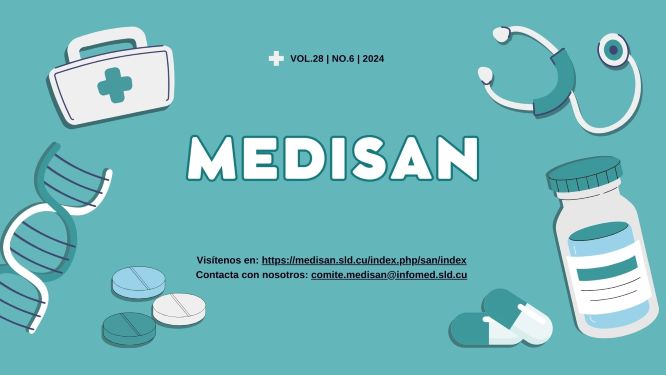Medicina Narrativa en la superación profesional para la prevención del VIH y la Sífilis congénita
Palabras clave:
medicina narrativa, infecciones de transmisión sexual, educación médicaResumen
Introducción: La medicina narrativa es una herramienta de la educación médica que usa las narrativas experienciales y personales de pacientes y proveedores para aumentar la comprensión científica de la enfermedad.
Objetivo: Demostrar la efectividad de la medicina narrativa como herramienta pedagógica en la superación profesional para la prevención de la transmisión materna infantil del VIH y la sífilis congénita.
Método: se realizó una investigación mixta, en 38 médicos de familia del Policlínico José Martí de Santiago de Cuba en enero- marzo del 2024, con la ejecución de encuestas, entrevistas y grupos focales, para evaluar a efectividad del curso de medicina narrativa empleándose además el modelo de evaluación de Donald Kirkpatrick. Los resultados fueron procesados y su porcentaje fue utilizado como medida de resumen.
Resultados: se pudo constatar la satisfacción en el personal médico con el uso de la medicina narrativa en la prevención y control de las ITS en un 92 %; adquirieron conocimientos y destrezas en un 81, 6 % y consintieron aplicar y practicar lo aprendido en igual proporción. Los resultados de las entrevistas coinciden con lo anterior.
Conclusiones: Los médicos de familia percibieron las narrativas como efectivas, importantes, útiles; proponen generalizarlo en la educación médica.Descargas
Citas
2. Kirmayer L J, Gómez-Carrillo A, Sukhanova E, Garrido E. Narrative Medicine. In: Mezzich, J.E., Appleyard, W.J., Glare, P., Snaedal, J., Wilson, C.R. (eds) PersonCentered Medicine. Springer, Cham 2023. [citado 20/08/2024] Disponible en: https://doi.org/10.1007/978-3-031-17650-0_14
3. Loy M, Kowalsky R. Narrative Medicine: The Power of Shared Stories to Enhance Inclusive Clinical Care, Clinician Well-Being, and Medical Education. Perm J. 2024 Jun 14;28(2):93-101. Disponible en: https://pmc.ncbi.nlm.nih.gov/articles/PMC11232909/
4. Urday-Fernández D, Cuba-Fuentes M. Medicina narrativa. An Fac med. 2019 [citado 20/08/2024];80(1):109-13. Disponible en: https://doi.org/10.15381/anales. v80i1.15880
5. Kirkpatrick DL. Thefourlevels of evaluation. In: EvaluatingCorporate Training: Models and Issues. Springer, Dordrecht; 1998 [citado 20/08/2024]. https://doi.org/10.1007/978-94-011-4850-4_5
6. Cuba Fuentes MS, Cruz Preciado LY Preciado, Mejía Victorio CS (edits). Narrativas desde la atención primaria de salud: historias de salud y enfermedad narradas por profesionales de la salud. Fondo Editorial UPCH, Lima Perú. 2021
7. Soto-Faúndes C, Pérez-Villalobos C. Profesionalismo y medicina narrativa. Rev. méd. Chile. 2022 Sep [citado 20/08/2024]; 150(9):8-113 Disponible en: http://www.scielo.cl/scielo.php?script=sci_arttext&pid=S0034-98872022000901234&lng=es
8. Krinock M, Defenbaugh N, DeTurk S, Pellegrino A. Anintroduction to narrativemedicine. International Journal of Academic Medicine. 2020;6(2):121-3. DOI: 10.4103/IJAM.IJAM_68_20
9. Butchart L, Parsa S. Narrative Medicine Theory and Practice: The Double Helix Model. Med Humanit. 2024 Feb 22;50(1):153-161.
10. Antinori A, Vergori A, Ripamonti D, Valenti D, Esposito V, et al. Investigating coping and stigma in people living with HIV through narrative medicine in the Italian multicentre non-interventional study DIAMANTE. Sci Rep. 2023 Oct 17 [citado 20/08/2024];13(1):17624. Disponible en: https://pmc.ncbi.nlm.nih.gov/articles/PMC10582167/
11. Moleka P. Unveiling the power of disclosure: Transforming HIV stigma through personal narratives. World Journal of Internal Medicine and Surgery. 2024 [citado 20/08/2024];1(2):17-22. Disponible en: https://wjims.com/admin/assets/article_issue/1712321482wjims_2024.pdf
12. Namer Y, Drüke F, Razum O. Transformative Encounters: A Narrative Review of Involving People Living With HIV/AIDS in Public Health Teaching. Public Health Rev. 2022 Jun 22 [citado 20/08/2024];43:1604570. Disponible en: https://pmc.ncbi.nlm.nih.gov/articles/PMC9258193/
13. Restall G, Ukoli P, Mehta P, Hydesmith E, Payne M. Resisting and disrupting HIV-related stigma: a photovoice study. BMC Public Health. 2023 Oct 21 [citado 20/08/2024];23(1):2062. Disponible en: https://pmc.ncbi.nlm.nih.gov/articles/PMC10590010/
14. Remein CD, Childs E, Pasco JC, Trinquart L, Flynn DB, Wingerter SL, Bhasin RM, Demers LB, Benjamin EJ. Content and outcomes of narrative medicine programmes: a systematic review of the literature through 2019. BMJ Open. 2020 Jan 26 [citado 20/08/2024];10(1): e031568. Disponible en: https://bmjopen.bmj.com/content/10/1/e031568
15. Morantes Valencia FM, Ariza Rodríguez M, García Villalba C.La narrativa como estrategia terapéutica y fortalecimiento de la ciudadanía en el tratamiento de personas con VIH-SIDA. Conrado. 2019 [citado 20/08/2024];15(70): 31-36. Disponible en: http://scielo.sld.cu/scielo.php?script=sci_arttext&pid=S1990-86442019000500031&lng=es&tlng=es
Publicado
Cómo citar
Número
Sección
Licencia
Esta revista provee acceso libre e inmediato a su contenido bajo el principio de que hacer disponible gratuitamente investigación al público, apoya aún más el intercambio de conocimiento global. Esto significa que los autores/as conservarán sus derechos de autor y garantizarán a la revista el derecho de primera publicación de su obra, el cuál estará simultáneamente sujeto a la licencia internacional Creative Commons Atribución 4.0 que permite copiar y redistribuir el material en cualquier medio o formato para cualquier propósito, incluso comercialmente, además de remezclar, transformar y construir a partir del material para cualquier propósito.





